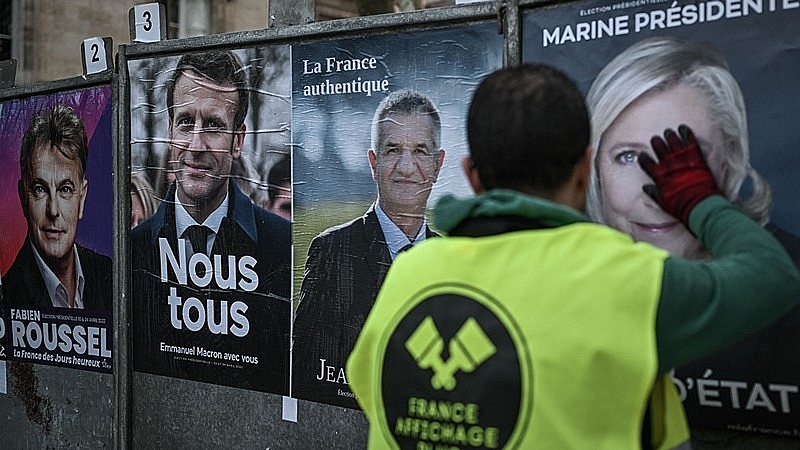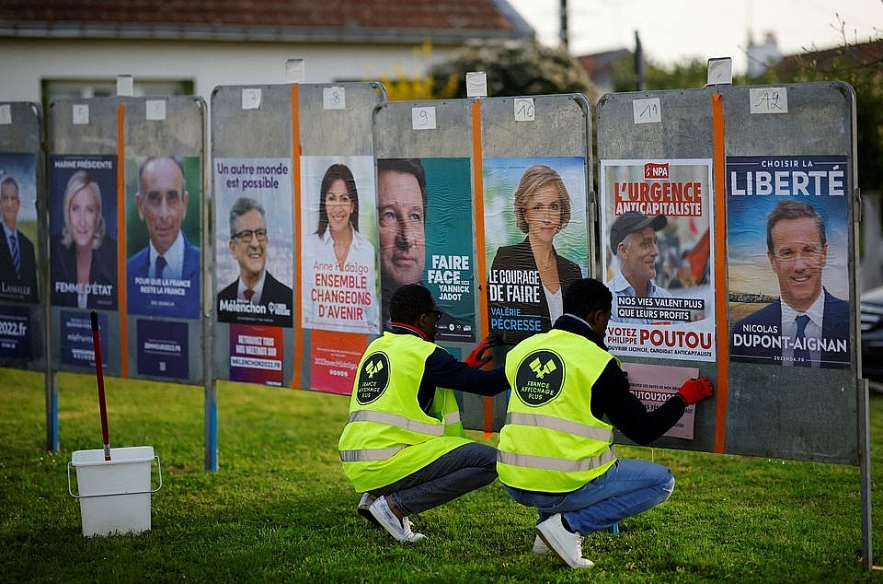Who Will be the Next President of France?
 |
| Who Will be the Next President of France? |
The public will go to the polls and place their first votes on 10 April.
Opinion polls suggest that incumbent Emmanuel Macron, from the centrist party La République en Marche, will probably win the election.
If no candidate wins 50% of the first-round vote, which the polls suggest is likely, the election continues into a second-round run-off on 24 April. In the second round, the top two candidates from the first round compete and the candidate with a majority wins.
The next president of Francre will face soaring public deficits to tackle the impact of the pandemic, a pension system many say needs reforming, and moves to re-industrialise France.
Key Dates for French Election
April 10 - Presidential election first round
April 24 - Second round held between the top two candidates.
May 13 - The latest day the new president takes office.
June 12 and 19 - Parliamentary election.
Who is leading in the polls?
According to Politico’s “Poll of Polls”*, Macron leads the pack of candidates and would mop up 28% of first-round voters. He is ahead of Le Pen (19%), Mélenchon (14%), Pecresse (11%) and Zemmour (11%). Mayor of Paris Anne Hidalgo, who announced an outsider pitch for the presidency in September 2021, trails the leading pack on just 2%.
The news site’s tracker suggests that Macron’s share of the first-round vote is up five percentage points on his 2017 victory and that he would win a second-round run-off with 58% of the vote. Le Pen and Mélenchon are forecast to pick up 42% and 37% of the vote in the second round respectively.
Le Pen closing gap on Macron
The incumbent, President Emmanuel Macron, is the favourite in opinion polls.
A poll by the Ifop-Fiducial group published on Monday indicated Macron would win by just 53 percent versus 47 percent for Le Pen, who had gained three points in a week.
A poll on Tuesday by Ipsos Sopra-Steria, meanwhile, showed Macron winning by 56 percent to 44 percent, again with Le Pen up by around three points in a week.
Macron has also been forced to defend his government's use of costly outside consulting firms such as the US-based McKinsey following a highly critical report from the Senate this month.
The investigation found that the value of such contracts had more than doubled between 2018 and 2021, reaching more than a billion euros ($1.1 billion) last year, a record.
1.Emmanuel Macron
Latest 7-day average (first-round preferences): 27.7%
Emmanuel Macron is widely considered the favourite to win re-election come April. The serving president is expected to tout “new foreign investment projects in France and a booming economy as proof his economic reforms have been bearing fruit” after four years in the role.
Even if he succeeds, Macron will need his centrist La Republique en Marche (LaRem) party - which has failed in all recent local elections - and its allies to win a parliamentary election in June if he is to have a strong platform to implement his policies.
2.Marine Le Pen
Latest 7-day average (first-round preferences): 19.9%
Le Pen’s programme mentions research in passing, promising to support basic science, research and development and innovation.
Running for a third time, Marine Le Pen is once again the candidate for her far-right Rassemblement national (National Rally) party. The daughter of the party’s founder, Jean-Marie Le Pen, is opposed to globalisation, which she has previously blamed for negative economic trends, as well as standing against any expansion in the EU’s power.
She has previously called for a referendum on leaving the bloc, but since 2019 has said she no longer advocates France leaving the EU or the euro currency. Her party also calls for the “de-Islamisation” of French society, while Le Pen has argued in favour of the establishment of a privileged partnership with Russia.
Unlike previous campaigns, she has “bet on dropping the populist messaging that once characterised her”, The New York Times (NYT) said, pushing efforts to “un-demonize” her party and its association “with flashes of antisemitism and xenophobia”.
| The race between Valerie Pecresse of the conservative Les Republicains, the far-right's Marine Le Pen and Eric Zemmour and the far-left's Jean-Luc Melenchon to be Macron's challenger in the likely second-round run-off. |
3.Jean-Luc Mélenchon: 14.7%
Mélenchon is a former Socialist who has stood for various leftwing groupings since leaving the party. He stood in the previous two presidential elections, winning more than 10% of the vote each time, and more than the Socialist candidate in 2017.
From the left of the French political spectrum, Jean-Luc Mélenchon, leader of the socialist Groupe La France insoumise, is also running for the top job. Like Le Pen, he is also on his third crack at winning the presidency.
4.Valérie Pécresse: 10.2%
Pécresse was budget minister under Nicolas Sarkozy and is currently the president of the Ile-de-France region, which includes the French capital and surrounding area. She describes herself as 'two-thirds Angela Merkel and one-third Margaret Thatcher', and has focussed on crime, immigration and the economy. She is the choice of Les Républicains, having won their primary on December 4.
Valerie Pécresse, the candidate for the centre-right Républicains, declared her candidacy in July 2021 following the party’s internal primary. Nicknamed “the bulldozer”, she has stated that she will be France’s first female president, describing herself as “one-third Thatcher and two-thirds Merkel”, France 24 said.
 |
| France's presidential election |
5.Eric Zemmour: 10.7%
Zemmour is a far-right TV pundit who has previously been convicted for inciting racial hatred and who promotes controversial views such as the 'great replacement' theory that Muslim immigrants will 'replace' the populations of European countries.
Zemmour “admires the former US president”, according to The Guardian’s Paris correspondent Angelique Chrisafis, and has been “convicted for inciting racial hatred”. But those criminal convictions have not stopped his “meteoric” rise to fame as first a journalist and now the “new face” of the French far-right.
6.Yannick Jadot: 5.3%
Jadot is the Green candidate. In the presidential election in 2017, he stood down in favour of the Socialist Benoît Hamon.
7. Hidalgo: 2.1%
Hidalgo is the first female mayor of Paris and is in her second term. She is best known for her campaign to reduce the number of cars in the French capital. As presidential candidate for the Socialist party, she has highlighted her working-class, immigrant roots, promising to improve salaries, notably for teachers.
| The slate includes 12 candidates, many of whom usually fail to poll more than 3% in surveys. They include Fabien Roussel of the Communist party, who in the last weeks of the campaign was polling more strongly than the Socialist candidate, Anne Hidalgo. Also running are Jean Lasalle of the Resistons! (Resist!) party and Nathalie Arthaud of Lutte Ouvrière (Workers' Struggle), a former Ford factory worker, Philippe Poutou, for the anti-capitalist Nouveau Parti Anticapitaliste, and the eurosceptic Nicolas Dupont-Aignan. |























